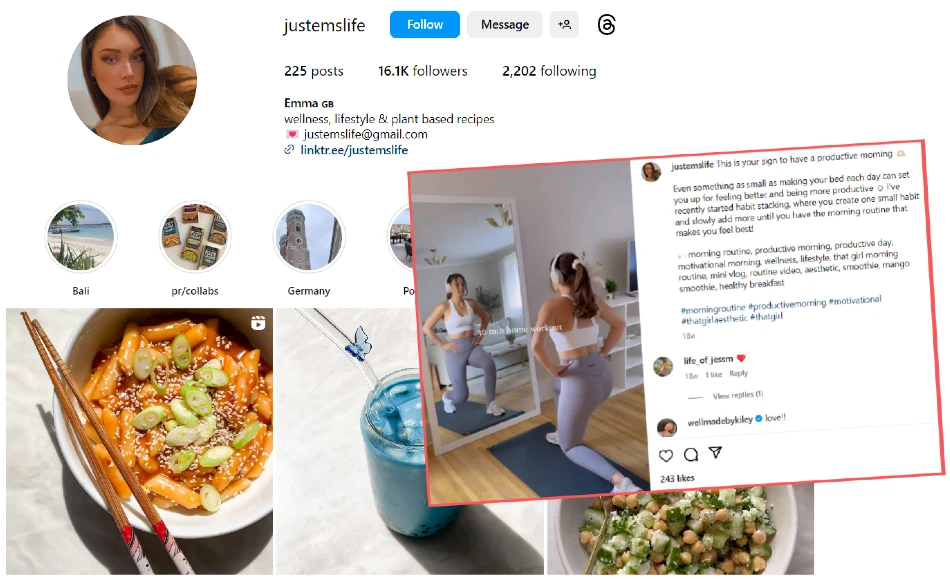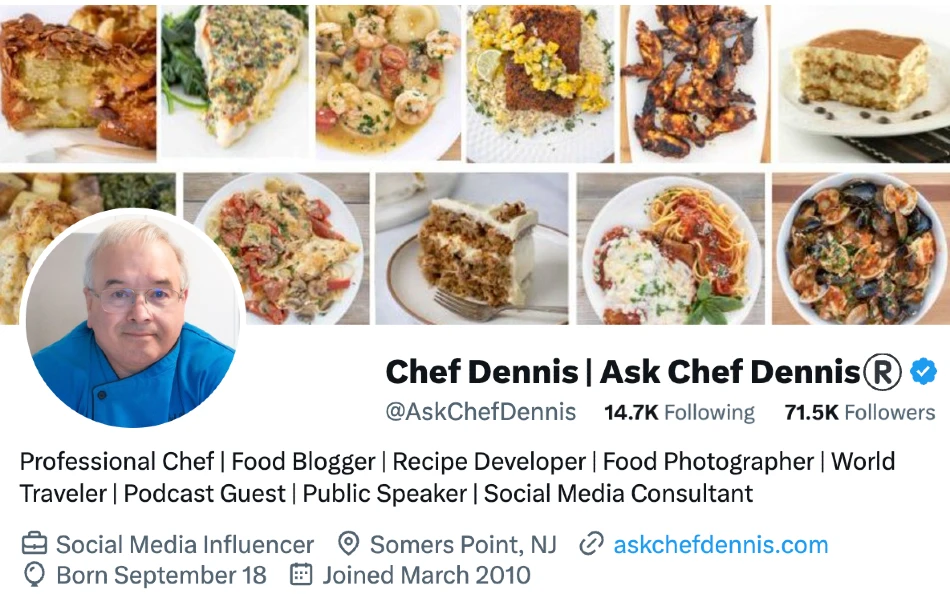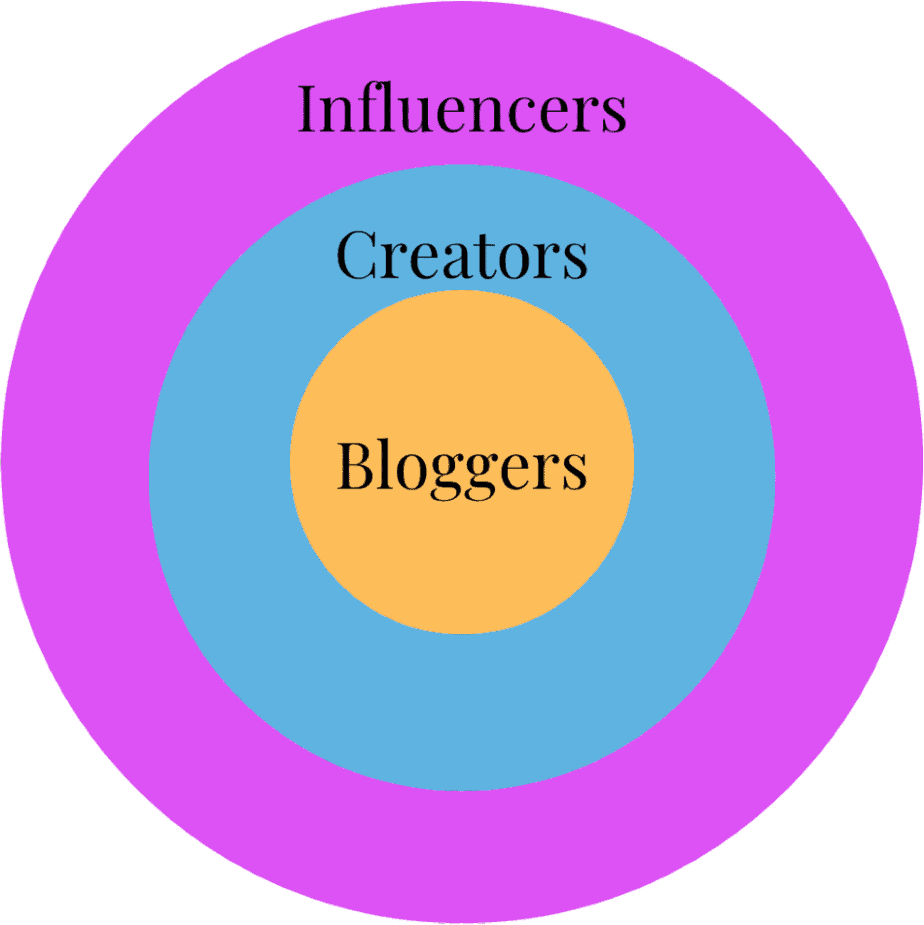Influencers. Bloggers. Creators. So many names for the same thing, right?
Actually, no. It turns out: these are not the same career paths, nor are the titles interchangeable. There is overlap between them, however. The issue is: these different terms have so much hidden behind the curtains that the difference is not always easy to spot. Given these are still new-ish careers, naturally, they’re surrounded by a bit of mystery and confusion.
But with the influencer marketing space all set to grow to over $21 billion this year, this is the time to get clear on the definitions and differences between influencers and bloggers.
“The lines between influencers and bloggers have become blurrier with evolving social media dynamics”, said marketer Olivier Adam. “Traditionally, bloggers focused on written content while influencers leveraged their reach for endorsements. Now, influencers can be bloggers and vice versa. It’s not just about the platform; it’s about impact. Bloggers share insights, influencers ignite trends. Yet, both engage and resonate. The digital landscape keeps shifting, but authenticity remains key.”
Both careers involve creating content online and having a strong presence to reach a global audience. So, if you’re looking to carve out your path and become one of the top influencers to watch, you will find everything you need to know in this blog.
Table of contents:
- What Are Influencers?
- What Are Bloggers?
- 5 Similarities Between Influencers and Bloggers
- 5 Differences Between Influencers and Bloggers
- FAQs About Influencers vs Bloggers
Let’s dive in.
What Are Influencers?
Simply put, an influencer is anyone with influence. Defining the term with more technical accuracy, an influencer is anyone with an established following (see also: “pull”) on a social media website like TikTok, YouTube, or Instagram.
Influencers have the power to influence their followers. Considered an expert in their fields (whether it be beauty, fitness, automobiles, or technology), influencers make a living by sharing their knowledge, expertise, and experiences with brands and products on their channels.
One such influencer is Emma Van Der Welle, a UK-based wellness influencer. She has amassed a global following of over 50,000 on TikTok and Instagram combined, covering both physical and mental health topics. She creates digital content that promotes sustainable, cruelty-free, vegan brands with a high engagement rate from her audience.

Emma is one of many wellness influencers today, promoting brands and speaking to their audience through their images and videos. In fact, 54% of young Americans today say they would want to become an influencer, given the opportunity.
The perception of this career is famously a combination of creative freedom and high-income potential. But notoriety is becoming increasingly commonplace today, and like most things, it has its pros and cons. With this influx of influencers on every social media platform, starting out as a newbie is not easy.
While there are a lot of monetization possibilities for micro and nano-influencers, you have to put in a ton of hard work, consistency, and understanding of the algorithm in order to make it a full-time career.
What Are Bloggers?
Now let’s discuss bloggers. Bloggers share expertise and experiences in a niche via an online platform for written content.
“Bloggers… I think of them as good writers. Working with bloggers can be great for SEO and for when people research reviews and opinions about a product before making a purchase decision,” said social media expert Savannah Sanchez.
Bloggers frequently post on personal/professional sites, sharing varied interests from business to travel. Chef and food blogger Dennis Littley is a good example. He has built his brand on Twitter with over 70,000 followers sharing his knowledge about cooking, helping answer queries, and engaging with fans through his writing.

Bloggers are a profitable asset for brands today, and the proof is in the numbers. Companies with blogs earn themselves 67% more leads every month than those that don’t. Lead generation’s importance makes bloggers highly valuable for their contribution in this regard.
But the scenery is rapidly changing, and blogging is no longer a hobby or a mere digital diary. With 600 million blogs on the internet today, we see somewhere around six million blog posts being published every day now. With a low-entry threshold and an easy-to-scale business path, blogging is a career many of us have thought about pursuing.
Newbie bloggers today have to outperform their competition while on the learning curve to get traction on their blogs. Understanding SEO and building an audience takes time, so this is a career path for those who can put in the time and effort to publish consistently good-quality posts.
Both influencers and bloggers have to balance authenticity with commercialization, and they have some similarities between them.
Similarities Between Influencers and Bloggers
Today, content creation is the top priority of 80% of marketers, according to Hubspot’s State of Marketing. Looking back, platforms like Facebook and YouTube only started gaining a large number of users in 2009, and Instagram wasn’t launched until October 2010.
It can be shocking to see just how many doors have opened up with new career opportunities that weren’t possible before. Influencers and bloggers both build their careers on the internet and can overlap in some ways. There are five primary similarities between an influencer and a blogger.
1. Personal branding
Both influencers and bloggers build their brands by creating and posting content that’s unique, informative, and entertaining. This personal brand is what they use to establish their authority in the field and blur the lines between personal opinions and promotional content.
Based on their unique talents, lifestyle, expertise, and interests, each influencer and blogger has a personal brand that’s completely characteristic of them. This is what their followers form a connection with and what brands want to collaborate with.
2. Sponsored content creation
Both influencers and bloggers earn a portion of their living by collaborating with companies to promote their products and services through sponsored content creation. These content topics cover everything they are passionate about, whether it be fashion, beauty, automobiles, or home decor.
The content can range from product reviews and recipes to tutorials, brand comparisons, and personal experiences. These content pieces help influencers and bloggers reach a global audience and give brands a loyal following to promote their products and services to. In exchange, brands pay them a fee or offer them a share of the sale they are able to generate.
3. Follower engagement
Both influencers and bloggers build a bond with their audience by replying to their comments, through live chats, and direct messaging. They engage with their followers on a regular basis to encourage them to support their content and help grow their reach.
With the consistent exchange of thoughts and feedback, they can foster a sense of trust and connection with their audience. Over time, this familiarity with them is what helps influencers and bloggers to land paid endorsements and successfully promote brands online.
4. Transparency
Both influencers and bloggers earn trust online by being transparent about the motivations behind their content. This includes paid ads on their profiles, affiliate links, and any other partnerships or endorsements they are legally bound to claim.
While the level of transparency may vary, the goal is to ensure the followers feel a collective sense of trust in them so both organic and paid content in the future is well-received. Both legally and ethically, the audience expects truth from the influencers and bloggers they follow.
5. Industry expertise
Both influencers and bloggers become known for their expertise in a specific industry or niche. Their knowledge could come from their education, experience, or personal stories. A fashion blogger in Utah, for instance, might showcase fashion accessories or clothing pieces from a variety of brands to compare them for their audience.
While some industries like lifestyle or cooking can be easier to enter into, others like mental health or fitness require the influencer or blogger to be certified in the field in order to gain credibility in their audience’s eyes.
Now that we know how the two are similar, we can discuss in what aspects they differ.
GET BIMONTHLY GROWTH INSIGHTS
Concise, proven tactics from leading brands and creators. Delivered to your inbox twice a month.
Differences Between Influencers and Bloggers
Every influencer and blogger is unique. According to marketer Andrea Bosoni,
“A blogger owns a domain and creates content on both social media and their own site. An influencer can also be someone who creates content only on social media.”
So while there may be some similarities between the two, there are five primary differences between an influencer and a blogger. Let’s go over each one in detail:
1. Type of content
Influencers create content in a variety of formats, including short-form and long-form videos, audio podcasts, still images, or a combination of all of them. This range of content possibilities allows them to explore many social media platforms and simultaneously build a following on multiple sites.
On the other hand, bloggers traditionally stick exclusively to written content, although now we see some bloggers diving into audio content and imagery as well. Their focus is on publishing articles and blog posts that dive deeper into each topic that they cover and answer any and all questions that their readers may have.
2. Platform of choice
The most popular platforms for influencers today are Instagram, TikTok, and YouTube. Other social media platforms, such as Facebook, also remain popular, and the difference lies in the type of content and audience that the influencer is interested in. Every platform boasts of individual quality, so long-form content performs best on YouTube, while short-form content is best seen on TikTok.
Talking about bloggers, WordPress holds the majority share of blogs that are active today. Although many successful bloggers write on platforms like Medium as well, long-term success with blogging is often seen by those who maintain high-quality content along with an understanding of SEO.
3. Audience interaction
Influencers interact with their audience in real-time through Instagram Live, post comments, and direct messages on social media. Their engagement rates depend on their ability to attract and retain the audience’s attention with every new piece of content they upload.
On the other hand, bloggers are known to engage in meaningful and deep one-on-one conversations with their readers. They interact with their followers through comments, social media platforms like Twitter, as well as incentives like giveaways that they host to boost engagement.
4. Monetization opportunities
Influencers earn a majority of their income through sources like brand collaborations, and product endorsements, along with partnerships like affiliate marketing and branded merchandise sales. Their monetization opportunities are unlimited today, as we see influencers who are able to earn through other avenues like ad-sharing revenue on the platforms they post.
Bloggers make the majority of their income using things like ads or Google Adsense on their websites as well as sponsored content. Writing platforms like Medium and Substack also pay writers to publish content regularly on their websites or through publications. Other than that, many bloggers go on to start their own brands too.
5. Means of expression
Influencers have at their disposal several ways to communicate their message to a global audience, including short-form and long-form videos, text-based captions, broadcast messages through status updates and tweets, and original images.
“I think blogging is just a tool. So if you’re truly a blogger, it means your blog (article-based, unique domain) is your vessel for monetization and your primary content space. A blogger can influence through their blog, but not all bloggers do. Depends on what you cover and share,” said writer Kayla Naab.
Bloggers typically share their thoughts through written content only, occasionally accompanied by a few images to add some details. Through different writing formats like short-form musings, longer articles, short stories, and even poetry, bloggers can produce high-quality, engaging, and valuable content.
One Twitter user, Andy Rosenberg, put the difference between influencers and bloggers well:
“An influencer monetizes through product. A blogger productizes through ideas.”
FAQs About Influencers vs Bloggers
Influencers, bloggers, vloggers, content creators—these all sound like interchangeable terms that everybody uses today.
Given that YouTube did not pay creators to upload videos until about a decade ago, and Medium did not pay writers with its Partner Program until 2017, your confusion here is valid. These words can sound similar but they are all categorically different paths with different meanings.
Here are simplified answers to your most asked questions:
Question: Are influencers and content creators the same?
Answer: Yes, and no.
All influencers are people with a large following on a social media platform like YouTube or Instagram and who can use their platform to influence the decisions of their followers and market brands they partner with.
Some of those influencers are content creators. They are people to create content—visual, written, or audio—and post it on social media to engage with their followers. If they have a big enough following they can be an influencer, else they are simply a creator.
Now, some of those content creators are those who only publish written content. This includes blog posts and articles that they share to engage with their followers. Their niche is naturally much smaller in most instances. A simple Venn diagram can make this easier:

Question: Is a vlogger an influencer?
Answer: Technically speaking, yes. Anyone who has an online follower base and can influence their purchasing decisions is an influencer. So a vlogger who displays their favorite breakfast cereal and encourages viewers to buy the same product is influencing them.
Similarly, a blogger, a YouTuber, and a TikToker can all be influencers as long as they can sway their audience’s decision and execute successful brand collaborations.
Question: Are influencers in the same category as celebrities?
Answer: While celebrities rise to fame thanks to their acting talent, the line between an influencer and a celebrity has become hazy recently. Some influencers are able to go beyond their original platform to climb to celebrity status with an army of loyal supporters cheering them on.
A great example of this is YouTube Emma Chamberlain. She originally became popular by posting videos of her life, called vlogs, but quickly garnered millions of subscribers. Since then, she has gone on to host the uber-exclusive Met Gala twice and seamlessly crossed the border between influencer and celebrity.
Question: Can anyone become an influencer?
Answer: Yes!
As long as you are passionate about a topic of interest and have the drive to consistently show up with original content online for your audience’s sake, you can become an influencer.
Today, we can see doctors, engineers, language coaches, writers, singers, CEOs, and pretty much people of every profession dip their toes in the pool of influencing. No matter what your field of expertise or background, an influencer remains simply someone who can build an audience and create a personal brand for themselves.
Question: Which platform is the best to become an influencer?
Answer: Short answer: it depends.
Based on what type of content you want to create, different platforms might or might not work for you. If you love editing snappy, short-form videos, TikTok is a great place to be. If you enjoy filming long videos, YouTube could be your best bet.
In reality, every platform can propel you into becoming an influencer today. Recently, Twitter also announced its ads revenue sharing program, and creators like Sahil Bloom are already cashing in the cheques.
So, whether you want to begin posting reels on Instagram or a podcast, all it takes to become an influencer is the drive to overcome challenges and build your own platform.
You Don’t Have To Resort To Tarot Cards To Find Your Perfect Match
Venture into the world of Afluencer where we match you up with Influencers and Bloggers perfect for your Brand. From travel to fitness, we have over 20K creators who can help you to grow your business.
FIND MY MATCH
Become an Influencer or a Blogger (Your Call)
Deciding what career to pursue full-time is an important decision for anyone to make. Now that you know the similarities and differences between an influencer and a blogger, you can start creating content with better clarity.
We know. You’re thinking that you want to start building your personal brand on your journey to becoming an influencer. So, now that you know the basics of how to become an influencer, we encourage you to take the first step and learn all about influencer marketing.
Install the Afluencer app for Shopify here to open the doors to potential earning opportunities with your dream brands and start getting paid influencer collaborations.